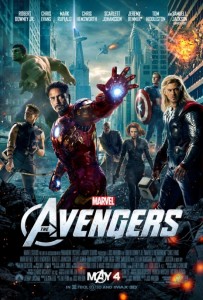Here Comes… Daredevil, The Show Without Network Censorship!
by Thom Yee
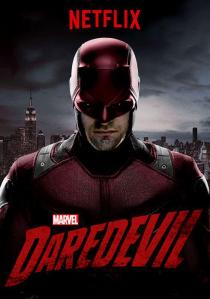
Daredevil images courtesy of Marvel Television and ABC Studios.
Ben Affleck.
For the last few years, I could recall a Daredevil movie as something that once happened, but apparently I’d so divested myself of any specific memories of it that I’d forgotten that Daredevil was once played by Ben Affleck. In one way or another, I think about and talk about superhero movies almost all of the time, even in the absence of appropriate social cues to do so and even in the presence of social norms suggesting to do otherwise, but even at the height of the Ben Affleck-is-the-new-Batman hysteria, I still failed to remember that Ben Affleck had been our one and only onscreen Man Without Fear.
And I supported the Affleck-Batman casting.
And I saw that Daredevil movie.
It’s hard to believe that a character like Daredevil has ever or would ever make any significant cultural impact, movie or not. Swashbuckling vigilante lawyer, blind but able to smell you from a mile away. And throw a stick (or “billy club”) at you. The only reason I ever had any interest in the character was because he was a cool-looking ninja type, but he was never a character I idolized or empathized with or held in any particular regard. I collected the entirety of the second volume of his comic book series, spanning more than 100 issues from the late 90s and through almost all of the 2000s, but even that was less out of interest for the character and more because the Daredevil editors managed to snag consistently strong writers throughout that second volume. No matter how much light those writers shed on the character, no matter how dangerous or intriguing their storylines may have been, and no matter how much they put Matt Murdock, Foggy Nelson and Karen Page through, I still didn’t really care about Daredevil. To me, he was a b-list character, never as tough or smart as Batman, never as strong or acrobatic as Spider-Man, dressed like the Flash, only with devil horns and no lightning bolts, but somehow with just enough of a fan following to sustain a monthly title.
When the Daredevil film rights reverted back to Marvel Studios in 2012, rather than launch headlong into another feature-length production, the studio heads went in another, much more appropriate direction for a character who’s always been more street-level than world-beating, deciding instead on a thirteen-episode Netflix series, free from the expectations of a theatrical release and not as limited as its network counterpart, Agents of S.H.I.E.L.D. While still taking place in the shared Marvel Cinematic Universe, Marvel’s Daredevil is nowhere near as bright, shiny, or humourous as The Avengers or Guardians of the Galaxy. It’s a bleak, bloody affair, and it’s definitely not for kids.
Now that I’ve finished all thirteen episodes, I’m not entirely convinced it’s for adults either.
After pushing an elderly man out of the path of an out-of-control transport truck, young Matt Murdock was blinded by the truck’s contents, radioactive chemicals that also heightened his remaining senses to inhuman levels. Soon after, his pro-boxer father was killed by gangsters for refusing to throw a fight, and young Matt found himself orphaned and overwhelmed by the extent of his new abilities until the mysterious Stick, himself blind, took Matt under his wing, training him in martial arts and teaching him to focus his powers. He could hear noises from miles away, track people by their scent alone, taste like no other man had ever tasted before…! Seeking to bring the guilty to justice, Matt grew up to become a lawyer in Hell’s Kitchen alongside his law partner, Foggy Nelson, trying criminals by day and stalking those who would escape the law’s grasp by night.
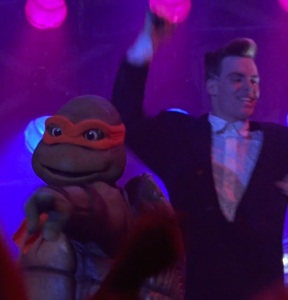
So if Daredevil inspired the Ninja Turtles, then “Ninja Rap” is your fault, Frank Miller!
The bulk of Daredevil’s popularity undoubtedly stems from writer/artist Frank Miller’s time with the character in the early 1980s, a run that also helped to usher in the broader concept of the ninja that would so dominate the popular culture of the decade (and into the next), from motorcycles to teenage mutant turtles. It was under Miller’s pen that we first met Daredevil’s college-girlfriend-turned-assassin, Elektra, his mentor, Stick, and the evil ninja clan, the Hand, and it was also Miller who established Kingpin and Bullseye as his deadliest adversaries after years of the character facing such fearsome foes as Stilt-Man, Leap-Frog, Angar the Screamer, and warmed-over Spider-Man villains. It’s Miller’s mid-90s return to the character, The Man Without Fear, that Netflix’s Daredevil is primarily based on.
Since Netflix releases its original programming in one big batch, the weird thing about watching any Netflix show is that not only can you watch an entire just-debuted season in one sitting, you almost feel pressured to, and sometimes it can seem like a contest as to who finishes first. For the first week of Daredevil’s release, I felt surrounded by news coverage, and reviews, and potential spoilers of the show, and the longer it took for me to make my way through each of the thirteen chapters, the more time there was for somebody I knew or some entertainment show I watched to ruin the whole thing for me. Most of the reviews I glanced over were especially glowing, and by the time I had finished the third episode, I was inclined to agree.
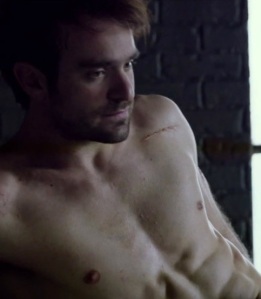
I shall defeat evil with the unleashed power of core exercise and impeccable scene lighting!
Like many, I was taken aback at first by the casting of Charlie Cox, a small, slender, relatively unknown English actor seemingly incapable of receiving a good haircut in the lead role, and as even he is apt to bring up in interviews, I just didn’t like his face. It’s been written in print that Matt Murdock is specifically seen as strikingly handsome, and though Charlie Cox isn’t directly bad looking, he’s also not as photogenic as I would’ve hoped for. To the actor’s credit, by the time the series was through, I not only believed in his Daredevil, I believed in his Matt Murdock. Cox has an undeniable charisma and ease in the role of Matt Murdock, and after watching a few scenes with him, I was just as willing to believe his nighttime activities could include going home with the girl just as often as going out to beat people up. In particular, there’s a scene where a girl asks him how he, as a blind man, combs his hair, and even though his response is simple (“Honestly, you hope for the best.”), I couldn’t help but laugh at the charm Cox brought to the moment. Perhaps equally as important, he also brings a particular weight to his fight scenes, with an acrobatic athleticism and functional toughness that both belies and works alongside the actor’s smaller stature. Take, for instance, the one-shot hallway fight for which the series has become famous:
That scene is so brutal and so well coordinated and so tiring and goes on for so long that it almost doesn’t fit in the superhero genre. It does make you wonder why the bad guys gave up on their guns so quickly, though.

My eyes! My eyes are burning, much like the burning I experience during urination.
With the series opening on a scene of young Matt losing his sight after selflessly saving another’s life, the show almost instantly makes its lead character and his father, horrified by what’s just happened and running to his child’s side, easy to empathize with. Of all the relationships on the show, it’s Matt’s with his father, billed “Battlin’ Jack Murdock” by his fight promoters, that I believed in most as we’re shown how much they cared for each other and how much time they made for each other despite how tough it was for the two to make ends meet. We never learn much about Matt’s mother, a tale no doubt waiting for later volumes to be told, but it’s clear that at least his father wants a better life for Matt, and even though you can make the argument that Jack’s eventual decision to not throw his fight was a prideful mistake that directly led to his demise, it’s framed and shot in such a way that you can’t help but feel for ol’ Battlin’ Jack and his own unseen struggles. Eventually, when Jack is killed, an event emblematic and typical of this world, I felt much worse for young Matt Murdock than I ever did for Batman Begins’ young Bruce Wayne and his sanctimonious parents.

And why do we fall, Bruce? So we can make people gag over our morally superior rhetoric.
The world of Daredevil is one in which crime pays well and one where it’s organized enough to adapt to even the most fantastic of circumstances. When the character was originally conceived, the real Hell’s Kitchen was a neighbourhood that lived up to its name, but today’s is an upscale, affluent area, and so the producers used The Avengers’ Battle of New York and its resulting destruction as the backdrop and means for the series’ primary villain to strike at the now vulnerable community. The first few episodes of Daredevil introduce us to Matt Murdock’s night-time exploits, his newly established law firm of Nelson and Murdock, and their legal secretary, Karen Page, whose problems with Hell’s Kitchen’s criminal element in the first episode of the series only hint at the menaces our title character will face. “Rabbit in a Snow Storm”, the show’s third episode, ends on a particularly chilling note in introducing crime boss Wilson Fisk, with a henchman who would rather kill himself (quite gruesomely) after revealing Fisk’s identity to Matt than have to face Fisk’s wrath.
And then things go south pretty quickly from there.
Shows like Daredevil, airing through less stringently regulated channels like Netflix, HBO, and AMC, are given to a particular level of prestige formatting and have frequently become darlings in what many critics call the golden age of television. Through Netflix, Marvel’s Daredevil has taken a decidedly less campy route than its big-screen forebear, but the danger in pursuing such a “gritty” take on fantastical superhero concepts is that, even after the necessary suspensions of disbelief (superpowers), the more the show hews toward realism, the more you’re quick to question its every aspect. One problem I immediately had and really never got over is that, as the Devil of Hell’s Kitchen, Matt constantly goes out with a minimum of gear, wearing dark pants and a sweater with no protection (he’s probably not even wearing a cup), and until Stick leaves him his billy clubs, he rarely has any weapons or even any tools with him. Eventually I concluded that maybe this incautious behaviour is reflective of Matt’s confidence in his abilities in the same way that I never use spell check even though it’s right there, but it’s not like I’m risking life and limb as I sit here at the keyboard. If you’re going out at night in the name of dark vengeance, I don’t know, maybe bring a baseball bat or something.
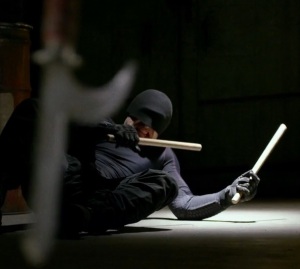
Wait a minute… your weapons are sharp? What a fool I am for bringing tiny sticks to a knife fight!
After the third episode, the stakes of the show start to feel artificially heightened as we meet Wilson Fisk, his lady love, Vanessa, who’s suspiciously fine with Fisk’s clearly amoral activities, and Fisk’s criminal network. What starts out as a seemingly complex array of crime specialists is quickly exposed as level bosses for Daredevil to beat up as he makes his way to the eventual kingpin at the top, and while I’m not blaming Daredevil for that basic structure, I am more than happy to blame it for the story’s lack of essential complexity. I don’t know what it is about Fisk’s empire that’s so organized or so unassailable or so intimidating that critics have allowed it to stand alongside the crime fiction and true crime stories we’re all more than familiar with after decades of award-winning novels, television series and movies, but when it comes right down to brass tasks, it is extremely believable that one determined man with a particular set of skills, a few friends, and the power of super-touching could bring Fisk’s empire crashing down, and that’s not a good thing.
Vincent D’Onofrio’s turn as Wilson Fisk has been widely lauded by critics, but I personally couldn’t stand the guy. Fisk receives a multi-layered background, a motivation that parallels our hero’s, and a reasonably strong character arc, and elements of the character do come together well, such as the opulent living conditions that crime has afforded him and his sheer, physical brutality (love that skull crushing), but D’Onofrio’s deliberately stilted line delivery, while powerful at times, also frequently makes him sound extremely unlikeable, particularly when it comes time for Fisk to get in front of the camera and become the face of Hell’s Kitchen’s rehabilitation (the media, of course, unaware of his crimes in achieving said rehab). Every time I saw him on screen, every time I saw him wooing politicians, I couldn’t help but hear a voice in my head screaming, “This guy needs media coaching!” Nobody, and I mean nobody, should find the character likable or trustworthy from a PR perspective, nobody would listen to him or take him seriously the way he talks or even have the patience to wait for him to finish his sentence in real life, and the only reason we, as the audience, are given to liking him is because we know he’s the bad guy, his speech patterns befitting those of a bad guy. Put a guy like him in front of the camera — fat, always looking emotionally out of sorts, his speech full of pregnant pauses and overtly serious tones — and I’ll show you a guy who could never win favourable public opinion. He’s like a more theatrical Chris Christie with none of that Governor’s inherent/unintentional humour.

As if one omelette’s gonna do it. Who you trying to fool, big guy?
Matt’s confidantes, Foggy (Elden Henson) and Karen (Deborah Ann Woll), leave much less of an impression and, therefore, fare a little bit better, but Foggy’s transition from outwardly annoying to functional and useful took a little too long for my tastes, and Karen never really gets to the point where I could find her trustworthy or likeable. I don’t really blame either actor for that, as it seems more a result of the material they’re given. Karen’s long been Matt’s recurring, go-to love interest since all the way back to the character’s 1964 debut and before, in-between, or after his breakups with the likes of Elektra and the Black Widow, but in this incarnation I would actually hate to see Matt and Karen together as a couple. Luckily, Rosario Dawson’s Claire, Matt’s private night nurse, is far more tolerable if not a little underutilized as a potential love interest and interesting character in her own right. Meanwhile, Scott Glenn’s Stick is just the right mix of merciless asshole and knowing father figure for a character as conflicted as Matt. I look forward to more of Stick in the future storylines hinted at at the end of his eponymous episode.
SPOILERS ON
That leaves us with the deathly duo of Wesley, Fisk’s right hand man, and meddling reporter Phil Urich, both of whom are basically killed by Karen. I think of all the characters in the entire series, I was close to liking Wesley the best. He was a ruthless, but genuine, faithful and caring ally to the often-erratic Fisk. Everything he said or did carried a certain gravitas because of his cool professionalism and it seems he was largely without ulterior motives even if he didn’t himself believe in Fisk’s dreams of rebuilding Hell’s Kitchen. Then they write him out like a punk with the stupidest death mechanism of all time: shot by Karen with the gun he left on the table to threaten her. What a stupid (and lazy) end to a character with enormous potential. Reporter Phil Urich, a classic background character who’s still alive in the comics, is another strong character, though his story is a little on the nose, but his death as a result of helping Karen find incriminating evidence on Fisk mostly served to make me dislike Karen even more no matter how much Urich’s wife claims it wasn’t Karen’s fault. At least it was an opportunity for more Kingpin skull crushing.
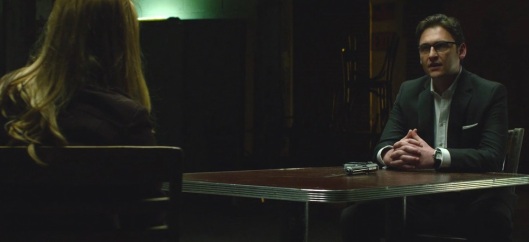
I’m going to answer my cell phone, Ms. Page, but before I do, I should probably take this gun I’ve been passive-aggressively threatening you with off the table, lest I become distracted by this call and you shoot me with it. Can you imagine how stupid that would make me look?”
Eventually, as the story reaches its inevitable climax, it starts to fall into several lazy storytelling traps. The death of Wesley, the death of Phil Urich, the death of Leland Owsley (Fisk’s financial expert); everyone’s dying at an alarming rate, and it makes the show’s pacing feel highly questionable. The seemingly complex web of the Wilson Fisk criminal empire turns out to be incredibly fragile, falling apart quickly and easily in a way that suggests it was less a Herculean (or Thor-ean?) task to overcome and more waiting for somebody to stumble along and put the pieces together. The show also starts to telegraph itself severely as it nears the end, such as when we learn the man who makes Fisk’s suit jacket armour is mentally challenged, leaving us to obviously conclude that the suit maker’s initial confrontation with Matt will inevitably result in a mutual understanding between the two and him building the armoured Daredevil costume we’ve waited all season for.
SPOILERS OFF
The final Matt/Daredevil-Fisk/Kingpin confrontation is also one of the weaker fights of the show, and the Kingpin’s defeat, though inevitable, paints a portrait of the Kingpin that more closely resembles a frightened crybaby than a criminal mastermind. I’m willing to concede that these early stories are serving as our origins and so our pro and antagonists are running around not fully formed, but I would still much rather have seen a Kingpin who treats these events as a stumbling block on his inevitable path to success rather than an utter defeat.
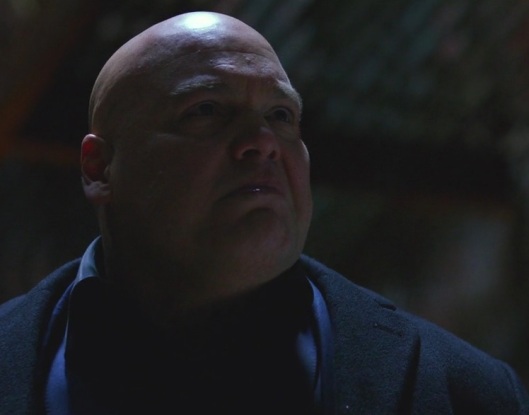
You took everything! Now I’m gonna go home and cry myself to sleep!
Listen, I liked Daredevil, overall and especially in parts, but its triumphs in execution just barely outweigh its failures as a story. Its first season is one that gets worse as it goes as you start to realize that it doesn’t have much more to tell you than what’s on its face. It’s violent and brutal and is capable of drawing empathy from viewers at its best, but its villains are eventually exposed as unexpectedly hollow, and their threat is ultimately resolved with a minimum of intrigue. Still, it shows promise as the first in a series of Marvel Cinematic Universe shows that will soon grow to become its own street-level Marvel microverse, one that may or may not eventually link up to the movie mothership. I’m not sure what other people are seeing when they lavish such high praise on Daredevil, but if I judge it on its own and I keep my head on straight, I can’t help but be fairly entertained, occasionally astonished, but also pretty let down.
Thom’s Daredevil season one final score: 7

